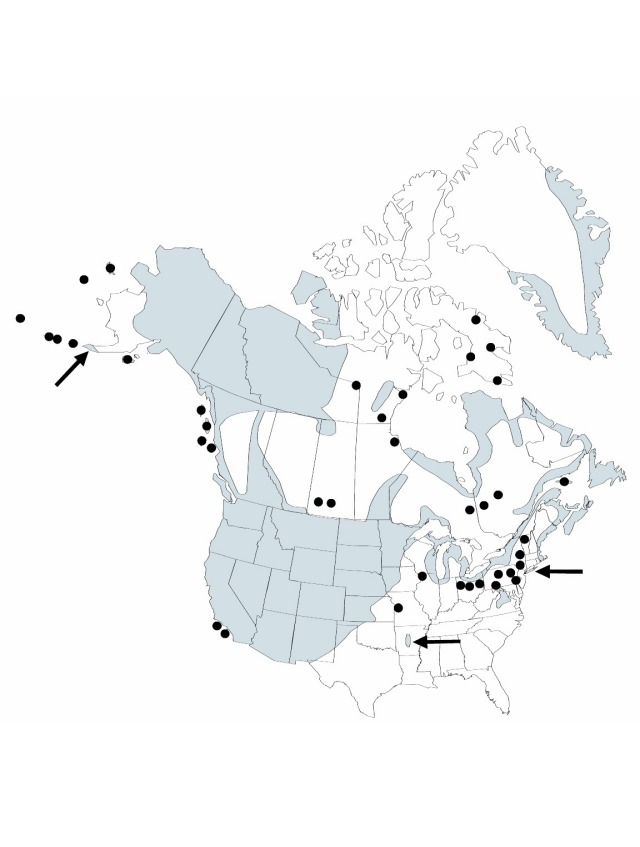Difference between revisions of "Juncus arcticus"
Sp. Pl. 2: 206. 1799.
FNA>Volume Importer |
FNA>Volume Importer |
||
| Line 17: | Line 17: | ||
}}<!-- | }}<!-- | ||
| − | --><span class="statement" id="st-undefined" data-properties=""><b>Herbs,</b> perennial, 2–10 dm. <b>Rhizomes</b> long- creeping. <b>Culms</b> erect, 1–3 mm diam. <b>Cataphylls</b> several. <b>Leaves</b>: blade usually absent (present in <i></i>var.<i> mexicanus</i>). <b>Inflorescences</b> lateral, 3–many-flowered, loose to congested; primary bract barely exceeding to many times longer than inflorescence. <b>Flowers</b> variously pedicellate; bracteoles membranous; tepals chestnut brown or paler, lanceolate, (2.5–)3.3–5.5(–6) mm, margins clear; inner series loosely subtending capsule at maturity; usually slightly shorter, margins scarious to clear, apex acutish to obtuse; stamens 6, filaments 0.2–1.1 mm, anthers 0.9–2.2 mm; style 0.9–1.5 mm. <b>Capsules</b> 3-locular or infrequently pseudo-3-locular, oblate to narrowly ovoid, 3.5–4(–4.5) mm, equal to or exceeding perianth. <b>Seeds</b> dark amber, oblate to ellipsoid, 0.6–0.8 mm.</span><!-- | + | --><span class="statement" id="st-undefined" data-properties=""><b>Herbs,</b> perennial, 2–10 dm. <b>Rhizomes</b> long- creeping. <b>Culms</b> erect, 1–3 mm diam. <b>Cataphylls</b> several. <b>Leaves</b>: blade usually absent (present in <i></i></i>var.<i><i> mexicanus</i>). <b>Inflorescences</b> lateral, 3–many-flowered, loose to congested; primary bract barely exceeding to many times longer than inflorescence. <b>Flowers</b> variously pedicellate; bracteoles membranous; tepals chestnut brown or paler, lanceolate, (2.5–)3.3–5.5(–6) mm, margins clear; inner series loosely subtending capsule at maturity; usually slightly shorter, margins scarious to clear, apex acutish to obtuse; stamens 6, filaments 0.2–1.1 mm, anthers 0.9–2.2 mm; style 0.9–1.5 mm. <b>Capsules</b> 3-locular or infrequently pseudo-3-locular, oblate to narrowly ovoid, 3.5–4(–4.5) mm, equal to or exceeding perianth. <b>Seeds</b> dark amber, oblate to ellipsoid, 0.6–0.8 mm.</span><!-- |
-->{{Treatment/Body | -->{{Treatment/Body | ||
| Line 65: | Line 65: | ||
|publication year=1799 | |publication year=1799 | ||
|special status= | |special status= | ||
| − | |source xml=https://jpend@bitbucket.org/aafc-mbb/fna-data-curation.git/src/ | + | |source xml=https://jpend@bitbucket.org/aafc-mbb/fna-data-curation.git/src/f6b125a955440c0872999024f038d74684f65921/coarse_grained_fna_xml/V22/V22_597.xml |
|genus=Juncus | |genus=Juncus | ||
|subgenus=Juncus subg. Genuini | |subgenus=Juncus subg. Genuini | ||
Revision as of 19:03, 24 September 2019
Herbs, perennial, 2–10 dm. Rhizomes long- creeping. Culms erect, 1–3 mm diam. Cataphylls several. Leaves: blade usually absent (present in var. mexicanus). Inflorescences lateral, 3–many-flowered, loose to congested; primary bract barely exceeding to many times longer than inflorescence. Flowers variously pedicellate; bracteoles membranous; tepals chestnut brown or paler, lanceolate, (2.5–)3.3–5.5(–6) mm, margins clear; inner series loosely subtending capsule at maturity; usually slightly shorter, margins scarious to clear, apex acutish to obtuse; stamens 6, filaments 0.2–1.1 mm, anthers 0.9–2.2 mm; style 0.9–1.5 mm. Capsules 3-locular or infrequently pseudo-3-locular, oblate to narrowly ovoid, 3.5–4(–4.5) mm, equal to or exceeding perianth. Seeds dark amber, oblate to ellipsoid, 0.6–0.8 mm.
Distribution

North America, Mexico, South America, Asia.
Discussion
Numerous entities have been circumscribed and recognized at various nomenclatural ranks by a plethora of authors addressing state or regional floras. In considering the Juncus arcticus-balticus complex as a whole in North America, one is soon confronted with a wide-ranging and obviously polymorphic complex that has not read the literature. It is abundantly clear that the systematics of the group will not be solved on the basis of morphology alone and that resolution of the problem is ripe for molecular investigations.
Varieties 3 7 (3 in the flora).
Selected References
None.
Lower Taxa
Key
| 1 | Anthers about as long as filaments; blades absent | Juncus arcticus var. alaskanus |
| 1 | Anthers at least 2 times as long as filaments. | > 2 |
| 2 | Blade-bearing leaves absent | Juncus arcticus var. balticus |
| 2 | Distal 1 or 2 leaves with obvious blade | Juncus arcticus var. mexicanus |